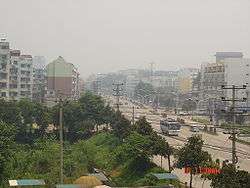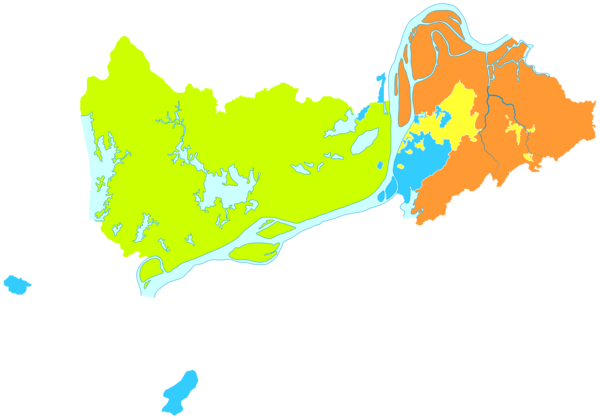Tongling
| Tongling 铜陵市 | |
|---|---|
| Prefecture-level city | |
 | |
.png) Location of Tongling City jurisdiction in Anhui | |
| Country | China |
| Province | Anhui |
| County-level divisions |
3 districts 1 county |
| Municipal seat |
Tongguan District (30°56′N 117°46′E / 30.933°N 117.767°E) |
| Government | |
| • CPC Secretary | Shen Suli (沈素琍) |
| • Mayor | Chen Liangping (陈良平) |
| Area | |
| • Total | 2,924 km2 (1,129 sq mi) |
| Population (2011) | |
| • Total | 741,500 |
| • Density | 250/km2 (660/sq mi) |
| Time zone | China Standard (UTC+8) |
| Area code(s) | 0562 |
| GDP | ¥32.5 billion |
| GDP per capita | ¥44,870 |
| License plate prefix | 皖G |
| Website | http://www.tl.gov.cn (Chinese) |
Tongling (simplified Chinese: 铜陵; traditional Chinese: 銅陵; pinyin: Tónglíng; Wade–Giles: T'ung-ling; former names: Tunglinghsien, Tungkwanshan; literally "Copper Hillock") is a prefecture-level city in southern Anhui province. A river port along the Yangtze River, Tongling borders Wuhu to the east, Chizhou to the southwest and Anqing to the west.
The asteroid 12418 Tongling was named after the city.
Geography
Tongling is located in southern Anhui on the southern (right) bank of the lower reaches of the Yangtze River, with latitude ranging from 30° 45' 12" to 31° 07' 56" N and longitude ranging from 117° 42' 00" to 118° 10' 06" E; the maximal north-south extent is 42.5 kilometres (26.4 mi), and the greatest east-west width is 40.6 km (25.2 mi).[1] It borders Fanchang County to the southeast, Qingyang County and Nanling County to the south, Guichi District of Chizhou to the southwest, and, northwest across the Yangtze, Wuwei County and Zongyang County.
Administration
The prefecture-level city of Tongling administers 4 county-level divisions, including 3 districts and 1 county.
| Map | ||
|---|---|---|
| English | Chinese | Pinyin |
| Tongguan District | 铜官区 | Tóngguān Qū |
| Jiao District | 郊区 | Jiāoqū |
| Yi'an District | 义安区 | Yì'ān Qū |
| Zongyang County | 枞阳县 | Zōngyáng Xiàn |
In 2012, the provincial government made plans to cede Zongyang County from Anqing City to Tongling City, in order to grant the latter land across the Yangtze.[2]
- Defunct divisions
- Tongguanshan District (铜官山区)
- Shizishan District (狮子山区)
History
Tongling has been famous as a beautiful mountain city since its origins in the Han dynasty over 1500 years ago. Owing to its copper and tin deposits, it was an important center in the past for bronze production. The scale of industrial activity gradually increased through the Ming (1368–1644) and Qing (1644–1911) dynasties, the Japanese occupation of 1938-45, and especially under the Communist government since 1949.
Economy
Today the city's industrial base still revolves around the several nearby copper mines and copper processing operations. The local mineral resources also include : iron, coal, gold, silver,tin, Iron sulfide, plus more than twenty other rare minerals associated with them such as nickel, cadmium, gallium, molybdenum, germanium and selenium. Other important industries include chemical works, textiles, building materials, electronics, machinery and food processing. Long a hub of water transportation, in 1995 Tongling became the site of Anhui Province's first highway bridge spanning the Yangtze River.
Although Tongling City is mostly mountainous, the surrounding flatlands are rich agricultural regions producing rice, wheat, cotton, beans, garlic, herbal medicines and ginger. Large amounts of fish are also harvested in the region.
Tongling is the center for conservation efforts to preserve the last remaining Yangtze freshwater dolphins. Two semi-natural reserves have been established in the Tongling area, in the Tongling and Shishou oxbow lakes, but as yet no dolphins have been successfully captured and moved from the river into the lakes.
Tongling has developed at a rapid speed in the past 5 years,i.e. 2003 to 2007.The average GDP per capita has reached ¥44,870 in 2008 which is the second in Anhui province. And the increasing rate is 13%, far more than the average increasing rate of the whole province which is 12.8%.And it aims to achieve $10000 GDP per capita in 2012
Transport
As of January 2015, Tongling has one bridge across the Yangtze River and one under construction.
Rail
Tongling is served by the Nanjing–Tongling, Tongling–Jiujiang Railways and Beijing-Fuzhou Railway.
Culture
The famous poet of Tang Dynasty, Li Bai (c.700–762, also known as Li Po) praised the beauty and richness of Tongling.
International Relations
Tongling has established relations with 5 locations throughout the world.
Twin towns:
-
 Borough of Halton, United Kingdom
Borough of Halton, United Kingdom -
 Leiria, Portugal
Leiria, Portugal -
 Skellefteå, Sweden
Skellefteå, Sweden -
 Marbach am Neckar, Baden-Württemberg, Germany
Marbach am Neckar, Baden-Württemberg, Germany -
 Antofagasta, Chile
Antofagasta, Chile -
 Varese, Italy
Varese, Italy
The contract of town-twinning with the city of Marbach am Neckar was established in 1990 and was among the first Sino-German town-twinnings, or sister city relationships. One lady citizen of Marbach am Neckar has been awarded honorary citizenship of Tongling City in 2005, recognizing her relentless effort to keep up the town-twinning. Marbach is the birthplace of the famous German poet Friedrich Schiller (1759–1805), as a symbol of friendship a statue was erected in local Tianjinhu-Lake-Park.
References
- ↑ 铜陵城市介绍 (in Chinese). Weather China. Retrieved 2013-01-07.
- ↑ "我省出台方案落实中部崛起新政 细化83项重点工程". Tongling People's Government. Retrieved 2013-01-07.
"Tongling". Baidu. Retrieved 22 March 2013.
"China Tongling". Tongling People's Government. Retrieved 22 March 2013.
"Tongline News". Tongling News. Retrieved 22 March 2013.
External links
- Government website of Tongling (in Simplified Chinese)
